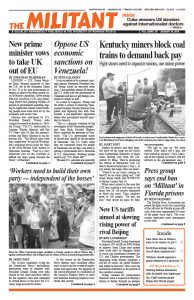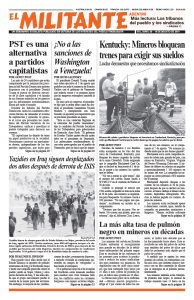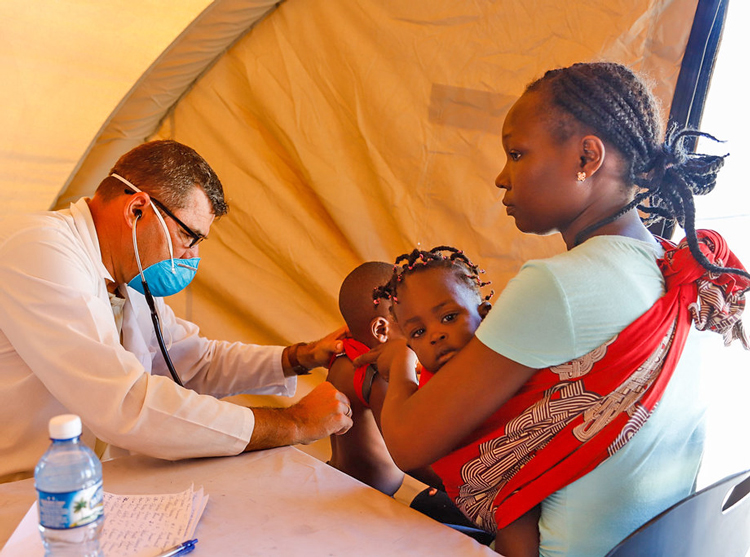Hoping to stain the image of the Cuban Revolution, Secretary of State Mike Pompeo slandered Cuba’s international medical assistance program, saying it engages in “exploitative and coercive labor practices” towards its volunteer doctors.
Pompeo announced July 26 that the State Department will deny visas to “certain Cuban officials & others responsible” for Cuba’s overseas medical aid programs. “Cuba must cease using this program to earn money on the backs of its citizens,” he said. The list of sanctioned officials has not been released.
Pompeo’s slanders — and similar ones made by Brazilian President Jair Bolsonaro — that the Cuban medical personnel serving abroad are “slaves,” are an attempt to hide the conquests made by workers and farmers in Cuba over the last five decades.
The building of a society based on the conscious solidarity of Cuba’s working people is what defines the character of the primary care and medical education that 30,000 doctors, nurses and other health technicians trained by the Cuban Revolution are bringing to 67 countries around the world. Washington’s lies are used to justify the economic war it has waged for more than 60 years, aimed at overturning the Cuban Revolution.
“You will never be able to lie to the Brazilian people who know well the nobility and humanity of the Cuban medical program,” said Cuban President Miguel Diaz-Canel in response to claims made by Bolsonaro. The charges “are the height of cynicism.”
At the end of June, Cuban doctor Enmanuel Vigil Fonseca answered Washington’s slanders in an interview with BBC. Vigil is a stalwart of Cuba’s Henry Reeve International Contingent, created in 2005 at the initiative of late President Fidel Castro to provide medical care after natural disasters and to fight epidemics around the world.
Vigil was one of the 256 Cuban volunteers who played a key role in combating the Ebola epidemic in Liberia, Sierra Leone and Guinea-Conakry from 2014 to 2015.
Opponents of the revolution allege that Cuba only sends help to other countries because they badly need the revenue for Cuba’s economy.
“When the Henry Reeve brigade is deployed, it takes care of logistics, medicines, tents, electric generators,” he noted. “We don’t say, now that we are here, we need you to pay us.” In addition to combating Ebola, the brigade aided victims of the 2005 earthquake in Pakistan and the 2015 earthquake in Nepal among numerous other missions.
Some of the medical services provided by Cuba’s international missions abroad are through agreements that include payment, others are provided at no cost.
The payment terms are no secret to the participating volunteers. The much needed currency is used to maintain the social gains of the revolution. “Each participant knows that they get a part and the rest goes to the National Health System, to the government. Not into someone’s pocket to enrich themselves,” Vigil said.
Vigil answered the slander that the Cubans’ health missions in Venezuela were used to push people to vote for the government of Hugo Chávez and now of Nicolás Maduro and denied care to government opponents. Washington deliberately lies, saying Cuba maintains 20,000 soldiers in the country to prop up the government of Maduro. The overwhelming majority of the Cubans serving in Venezuela are doctors, teachers and sports instructors.
“We are doctors with the desire to help and the people opened their doors to us, both those who were in favor of the government of Chávez and those who were against,” Vigil recalled. “There was no difference there.”
In the introduction to the Pathfinder book, Capitalism and the Transformation of Africa, Mary-Alice Waters, a leader of the Socialist Workers Party, addresses this question also.
“How has Cuba — with its limited economic resources and in face of unceasing aggression by Washington — been able to create a medical system acknowledged around the world for its excellence?” she said. “Why is no other country on the face of the earth capable of anything similar?”
It’s because working people there made a revolution, Waters said. “Their economic, social and political accomplishments since then — from health care and education, to aid given freedom fighters the world over — have been possible only because they took the power to rule out of the hands of the landlords and capitalists.”


